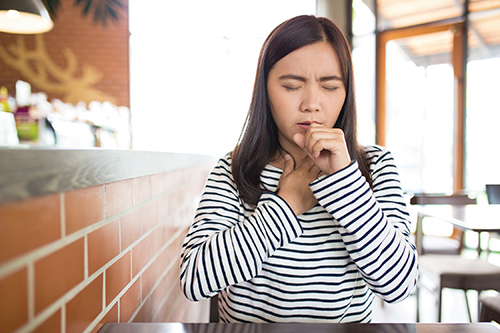HEALTHY LIVING
Proactive health tips to navigate year two of the pandemic

(Family Features) After months of unfamiliar restrictions and guidelines, pandemic fatigue is affecting how some Americans protect their health. However, experts warn that diligence is still extremely important because new mutations and variants of the virus that causes COVID-19 are being discovered. The typical cold and flu season also brings added threats to people’s health and wellness.
“Staying diligent is one of the most important things we can do as we navigate through cold and flu season as well as the COVID pandemic,” said family medicine physician Dr. Jennifer Caudle.
Though you may still be spending more time at home, it’s important to take proactive steps to maintain your health. Caudle offers these practical tips to help protect your health while you’re waiting for vaccination eligibility amid the pandemic this cold and flu season.
Avoid Exposure
As COVID-19 continues to impact communities from coast to coast, there’s no better time to avoid getting sick. Even if you catch a less serious illness like a cold or the flu, health care professionals in many areas are stretched thin. What’s more, getting sick could compromise your immune system, making you more susceptible to a more serious infection.
Minimizing your risk of exposure means limiting close contact with others outside your household, wearing a mask and washing your hands regularly with soap for at least 20 seconds. An alcohol-based sanitizer that is at least 60% alcohol can substitute for hand washing, if necessary.
Always avoid touching your face when out and about, and when possible, avoid high-touch surfaces like door handles and light switches. If you’re prone to allergies, be conscious of what triggers allergic reactions and manage your allergies so you’re able to easily identify any new symptoms that may not be allergy related.
Practice Self-Care
Staying healthy isn’t just about avoiding germs. Managing your physical health means keeping your body in top condition by eating right, exercising, getting enough sleep and ditching habits that can negatively impact your body, like smoking and excess drinking. It’s also important to monitor your mental health since factors like stress and depression can take a physical toll that impacts your body’s immune response.
Pinpoint Symptoms
If you get sick, it’s important to pay close attention to your symptoms. However, this cold and flu season brings a unique variable with the possibility that your symptoms may actually stem from a mild case of COVID-19. Weather may also fuel stronger than usual allergy responses, so distinguishing between cold, flu, COVID-19 and allergy symptoms can be especially tricky. Testing may be necessary to get the proper diagnosis and ensure you’re taking the right precautions to prevent the spread of any infection. If you have questions or concerns about your symptoms or about COVID-19, consult your health care professional.
Treat Symptoms
Depending on your diagnosis, a health care professional may suggest medication to help treat symptoms until your illness runs its course. There are a variety of products available over the counter that are commonly used to treat symptoms of respiratory viral infections. Many provide relief from multiple symptoms in a single dose. For example, an option like Mucinex DM lasts 12 hours when used as directed and contains dextromethorphan, which helps to control cough, and guaifenesin to help thin and loosen mucus.

Control a Pesky Cough
How long a cough lasts depends on its cause, but you may be able to tame the symptoms until it’s gone.
Eat Right
- Produce is packed with vitamin C, a nutrient that helps support your immune system.
- Menthol may be a soothing natural remedy. It’s one of the compounds that gives mint its flavor, so brew a cup of strong mint tea and put it to the test.
Steam and Hydration
- Both steam and water help thin your mucus, which may help clear chest congestion. Try a warm, steamy shower or a soak in a hot tub and drink plenty of fluids to keep your body hydrated.
Around the House
- If you’re struggling with a parched throat from your cough, try gargling salt water to soothe discomfort.
- Lozenges increase your saliva production to help soothe a parched throat and get you feeling better as your cough subsides.
- Exposure to particulates in the air, like pollutants and irritants, may be linked to nighttime dry coughing. A high-efficiency particulate air filter can help remove them.
- Wipe down surfaces. Cleaning removes settled dust and pollen while disinfection can help remove lingering cold and flu germs.
- If you’re smoking, stop. Smoking is a leading cause of chronic cough. Also avoid secondhand smoke as much as possible.
- Rest recharges your immune system, and getting enough sleep may help you cope with an illness that is the cause of a lingering cough. An option like Mucinex Fast-Max All-In-One Cold & Flu relieves nine symptoms including cough, stuffy nose, sore throat, fever and headache so you can get on with your day.
- Rely on a cough medication that contains dextromethorphan, which works on the cough center of your brain to help suppress coughing.
You can identify the right formula to provide relief based on symptoms you are experiencing by using the online tool at Mucinex.com, where you can also find more information regarding self-care remedies.
Photos courtesy of Getty Images
SOURCE:
Mucinex
HEALTHY LIVING
Tips for older adults and caregivers this holiday season

(Family Features) The holidays are coming up, and many people will be celebrating with family and friends. The start of colder months also means flu, COVID-19 and RSV can surge. That can be dangerous for older adults.
“Holidays are a time to gather with family and friends,” said Charlene Wong, MD, MSHP, senior advisor for health strategy at the Centers for Disease Control and Prevention (CDC), “but for older people, this can come with risk of serious respiratory illness. Get your updated flu, COVID-19 and RSV vaccines to reduce your risk and do more together.”
Before heading to holiday gatherings, check out these tips from the Risk Less. Do More. vaccine education campaign. They can help you and your older loved ones enjoy a happy holiday season while lowering the risk of serious illness from flu, COVID-19 and RSV.
Get Vaccinated Against Respiratory Illnesses
Older adults are at higher risk of getting seriously ill, ending up in the hospital or dying from flu, COVID-19 or RSV. Vaccines are the best protection against severe disease from these common respiratory illnesses. The CDC recommends that all adults ages 65 and older get the updated flu and COVID-19 vaccines. An RSV vaccine is also available to help protect older people from severe RSV. It is recommended for all people 75 and older, and for those ages 60-74 with certain health conditions, like heart or lung disease or diabetes, or who live in a nursing home. If you are a caregiver or help an older adult with their medical decisions, encourage them to talk to their doctor about the vaccines that are right for them.
Gather Safely
Respiratory illnesses often thrive in indoor spaces where people are in close contact. If the weather permits, try hosting holiday gatherings outside. When gatherings are inside, think about keeping windows open or using fans for ventilation. If you are going to a large indoor gathering, consider wearing a mask. Washing your hands frequently, or using hand sanitizer, also helps reduce the spread of germs. Encourage your older loved ones to take these precautions as well.
Stay Home If You’re Sick
No one wants to miss out on festivities, but it’s important to stay home if you are not feeling well. Encourage your family and friends to do the same. Remind them about the impact flu, COVID-19 and RSV can have, especially on older adults. If you’re a caregiver of an older adult, monitor any respiratory symptoms that may develop. Testing for flu and COVID-19 can also help inform your plans. All U.S. households can now receive four free COVID tests. Order them for your family and your loved ones at COVIDTests.gov.
For many older people, the fall and winter holidays are an important time to connect with others. Be sure to include vaccinations in your holiday planning. Go to vaccines.gov to get started today.
You can also learn more about flu, COVID-19 and RSV at cdc.gov/RiskLessDoMore or by talking to your doctor about which vaccines are right for you this season.
Photo courtesy of Shutterstock
SOURCE:
United States Department of Health and Human Services
HEALTHY LIVING
How to get free vaccines for flu, COVID-19 and RSV

(Family Features) Respiratory viruses are common in the fall and winter months. Flu, COVID-19 and RSV can surge during the cooler weather and keep people from gathering with family and friends. They cause many people to get very sick or even to be hospitalized.
“We know that getting vaccinated is the best defense against severe illness and death caused by flu, COVID-19 and RSV,” said Nirav D. Shah, MD, JD, principal deputy director of the U.S. Centers for Disease Control and Prevention. “Respiratory virus season is here and now is the time to get your updated vaccines so you can focus on what matters most: spending quality time with friends and family.”
Vaccines help people risk less serious illness, so they can do more of what they enjoy. Everyone 6 months old and older should get this season’s flu and COVID-19 vaccines. Adults ages 75 and older, adults 60-74 years old who have certain health conditions and adults age 60 and older who live in nursing homes should get an RSV vaccine if they have never been vaccinated against RSV. Pregnant people should also get an RSV vaccine to protect their babies from severe RSV disease in their first six months.
Getting vaccinated can be easy, and in many cases, it’s free. Here’s what you need to know.
Where Can You Get Vaccinated?
There are many places to get vaccines against flu and COVID-19, as well as RSV if you’re eligible. It’s OK to get all of these vaccines in one visit.
You can get vaccinated at some doctor’s offices, local health centers or most pharmacies. To find pharmacies near you, visit vaccines.gov. Your state or local health department may also be able to tell you where you can get vaccinated in your area.
Are the Vaccines Free?
If you have insurance: If you’re covered by Medicaid, or if you qualify for it, you can get the vaccines at no cost. People with Medicare (Parts B and D) or Medicare Advantage can also get the vaccines for free.
If you have private insurance through your job or your state’s marketplace, most plans fully cover the flu, COVID-19 and RSV vaccines through in-network doctors.
If you are uninsured: If you don’t have health coverage, your state or local health department or a local community health center may offer the flu, COVID-19 and RSV vaccines at no cost. Companies that make these vaccines may also offer them for free or at a lower cost through their patient assistance programs. Look for information on their websites.
To explore insurance options and affordable health plans, visit HealthCare.gov or see if you can get covered through Medicare or your state’s Medicaid program.
Get Vaccinated Now
Vaccines give you the best protection against getting very sick from flu, COVID-19 and RSV. Getting vaccinated soon means you’ll be ready for upcoming winter gatherings.
Visit cdc.gov/RiskLessDoMore to learn more about the flu, COVID-19 and RSV vaccines. Also, you can order free COVID-19 test kits (four per household) at COVIDTests.gov. Talk to your doctor about which vaccines are right for you or visit vaccines.gov to get started today.
Photos courtesy of Shutterstock
SOURCE:
United States Department of Health and Human Services
HEALTHY LIVING
What you don’t know can hurt: 3 facts about updated COVID-19 vaccines

(Family Features) Four and a half years after the start of the COVID-19 pandemic, people are once again enjoying time with friends and family and doing their favorite things. However, the virus that causes COVID-19 keeps changing, so it’s still important to stay up to date on your vaccinations. Respiratory viruses, including COVID-19, are common during the fall and winter months. That’s why now is a good time to take care of yourself and your loved ones by getting the facts on the updated COVID-19 vaccines.
“As the virus changes, we are learning more and more about how to protect people from COVID-19,” said Namandjé N. Bumpus, Ph.D., principal deputy commissioner at the U.S. Food and Drug Administration (FDA). “Getting the latest COVID-19 vaccine means your protection is as up to date as possible.”
Here is information about this season’s COVID-19 vaccines from the Risk Less. Do More. public education campaign:
Vaccines are the best way to protect yourself and your loved ones from COVID-19. Getting vaccinated against COVID-19 lowers your chances of getting very sick or being hospitalized. Some people who get the vaccines still get sick, but vaccination can make symptoms milder. This is important if you are over age 65 or have certain health conditions. Both can put you at a higher risk for serious or long-lasting health problems, such as Long COVID or even death from COVID-19. If you do get COVID-19, ask your doctor about treatment options to reduce your risk of severe illness.
COVID-19 vaccines are regularly updated to keep up with the changing virus. The COVID-19 vaccines are updated based on the latest variants of the virus. The updated vaccines offer the best protection against the changing virus that causes COVID-19. Getting the latest vaccine boosts your immunity and lowers your risk of severe sickness.
Side effects for COVID-19 vaccines are usually mild and go away on their own in a few days. The most common side effects are soreness or redness at the injection site, headache or body aches, or fever. Severe side effects like anaphylaxis are rare, with about five adverse events per 1 million doses given.
Staying informed and getting this season’s COVID-19 vaccine – and encouraging loved ones to do the same – is one of the best things you can do to protect yourself and others this fall and winter. Knowing the facts about COVID-19 vaccinations can give you peace of mind and support a safer, healthier future for all. For more information, visit cdc.gov/RiskLessDoMore or talk to your doctor.
If you think you have COVID-19, testing can help. All U.S. households are now eligible to receive four free COVID-19 test kits. Order them today at COVIDTests.gov.
The Impact of COVID-19 In Black and Hispanic Communities
For the first two years of the COVID-19 pandemic, people in Black and Hispanic communities were consistently more likely to get COVID-19, need medical or hospital care, and die from COVID-19 than people in other communities. That gap has narrowed over time, but this past summer, Black people were still more likely to be hospitalized for COVID-19 compared to the average across all races and ethnicities combined. Hispanic people had lower than average rates of hospitalization. For everyone, getting the latest COVID-19 vaccine offers the best protection against severe disease and hospitalization.
Photos courtesy of Shutterstock
SOURCE:
United States Department of Health and Human Services
-

 NEWS2 years ago
NEWS2 years ago2 hurt, 1 jailed after shooting incident north of Nocona
-

 NEWS1 year ago
NEWS1 year agoSuspect indicted, jailed in Tia Hutson murder
-

 NEWS2 years ago
NEWS2 years agoSO investigating possible murder/suicide
-

 NEWS2 years ago
NEWS2 years agoWreck takes the life of BHS teen, 16
-

 NEWS1 year ago
NEWS1 year agoMurder unsolved – 1 year later Tia Hutson’s family angry, frustrated with no arrest
-

 NEWS2 years ago
NEWS2 years agoSheriff’s office called out to infant’s death
-

 NEWS2 years ago
NEWS2 years agoBowie Police face three-hour standoff after possible domestic fight
-

 NEWS2 years ago
NEWS2 years agoDriver stopped by a man running into the street, robbed at knifepoint





